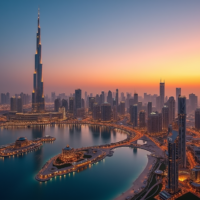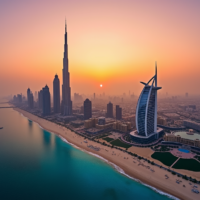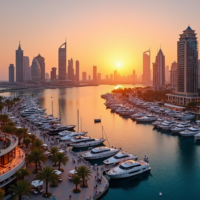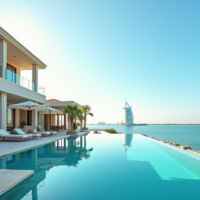The COVID-19 pandemic has radically reshaped many aspects of the global economy, with the real estate sector in Dubai undergoing considerable transformation. As we navigate the post-pandemic landscape, it’s crucial to examine the expected trends and developments in Dubai’s real estate market. The market is poised for recovery, driven by a combination of innovative policies, increased demand for residential and commercial properties, and a renewed focus on sustainability. In the following sections, we will delve into the factors influencing this evolution and what the future may hold for property investors and homebuyers in Dubai.
Current Real Estate Trends in Dubai

As of 2023, the Dubai real estate market showcases a variety of trends, all of which point toward a gradual but steady recovery. This significant shift has been catalyzed by several factors, including the decrease in remote working, a rise in expatriate population, and the city’s growing appeal as a safe investment destination. Key trends currently shaping the market include:
- Increased Demand for Villas and Townhouses: Post-pandemic, many people are seeking larger living spaces, prompting a surge in demand for villas and townhouses, particularly in suburban areas.
- Focus on Sustainability: Eco-friendly developments are becoming more popular as buyers increasingly value sustainability, prompting developers to incorporate green technologies into their projects.
- Foreign Investment Surge: With visa reforms attracting global investors, there has been a marked increase in foreign capital inflows, stimulating various segments of the market.
- Digitalization of Real Estate Transactions: Virtual property tours and online closures have gained momentum, revolutionizing how transactions occur and setting a new standard for convenience.
- Affordable Housing Initiatives: The government has rolled out various affordable housing programs, providing more opportunities for first-time homebuyers.
The Role of Government Policies

The government of Dubai has actively implemented various policies to support and stimulate the real estate sector in the aftermath of the pandemic. These policies not only aim to boost the economy but also to attract international investors and expatriates. Some of the notable initiatives include:
- Long-term Visa Options: The introduction of long-term visas for investors, entrepreneurs, and skilled workers has made Dubai a more attractive place to live and work.
- Relaxed Ownership Rules: Enhancing property ownership rights for foreign investors encourages further investment in the real estate sector.
- Support for Developers: Financial assistance and incentives for developers to focus on completion and quality of projects have also enhanced market confidence.
- Infrastructure Development: Continuous investment in infrastructure, such as transportation and other public services, is vital for boosting real estate demand.
Impact of Global Trends on Dubai’s Market
The broader global real estate trends are also impacting Dubai’s market. As cities worldwide adapt to the changing preferences of residents, Dubai is keen to mirror these changes. Several global trends are particularly relevant:
- Shift Toward Remote Work: Many companies are adopting flexible work arrangements, increasing the demand for homes equipped with office space.
- Desire for Urban Living: As cities become safer and more vibrant, urban living remains in demand, leading to potential revitalization of central areas.
- Investment in Technology: Smart homes and tech-enabled facilities have become features buyers prioritize, indicating a trend toward more advanced property offerings.
Challenges Facing the Market
Despite the positive outlook, Dubai’s real estate market faces several challenges that could hinder its recovery trajectory. Addressing these concerns will be essential to fully capitalize on the potential for growth. Key challenges include:
- Market Saturation: A surplus of properties in certain segments may lead to stagnation unless demand increases significantly.
- Economic Uncertainty: Global economic uncertainties stemming from geopolitical tensions can affect foreign investment flows.
- Regulatory Changes: Frequent changes in regulations can create hurdles for developers and investors trying to navigate the landscape.
- Environmental Concerns: Increasing environmental awareness may impose new regulations that could limit development options.
Conclusion
In conclusion, the future of Dubai’s real estate market post-pandemic appears optimistic, driven by evolving buyer preferences, supportive government policies, and an influx of foreign investment. However, addressing challenges such as market saturation and economic uncertainties will be paramount for sustainable growth. Developers and investors who adapt to changing trends while aligning with regulatory frameworks will likely find success in this dynamic environment. As Dubai continues to innovate and reposition itself on the global stage, the real estate market is set to remain a cornerstone of the city’s economic resurgence.
Frequently Asked Questions
1. Is it a good time to invest in Dubai real estate post-pandemic?
Yes, many indicators suggest that now is a favorable time to invest, particularly with the increasing demand for larger living spaces and government incentives for foreign investors.
2. What types of properties are in high demand in Dubai currently?
Villas and townhouses have seen a significant increase in demand as buyers seek larger homes and outdoor spaces post-pandemic.
3. How has the government supported the real estate market in Dubai?
The government has introduced long-term visas for investors, relaxed ownership regulations for foreigners, and provided financial support to developers.
4. What challenges does the Dubai real estate market face?
Challenges include market saturation, economic uncertainties, regulatory changes, and environmental concerns that may affect development plans.
5. What future trends can we expect in Dubai’s real estate market?
Future trends may include an increased focus on sustainability, the rise of smart homes, and the introduction of more affordable housing options to cater to a wider audience.









